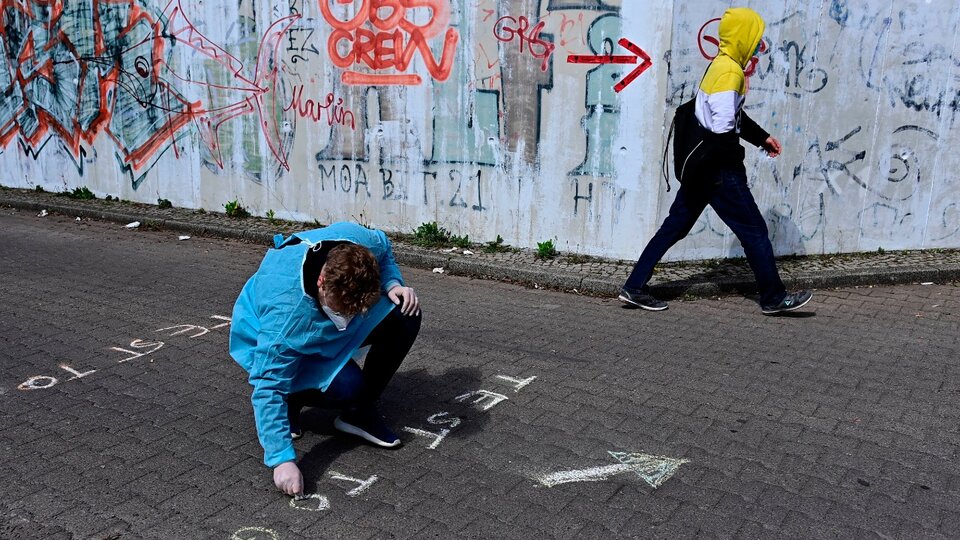
[ad_1]
From this midnight begins the first night curfew in Germany. European country confirmed more than 250 deaths from covid-19 in the last day and it has more than 81,000 people who have died since the start of the pandemic.
According to the law adopted yesterday by the German parliament, Regions that detect more than 100 cases per 100,000 inhabitants per week must impose a curfew between 10 p.m. and 5 a.m., closure of leisure centers, shops and suspension of sporting events.
Currently more than 330 of the country’s 400 districts exceed this level of incidence, as reported by the Robert Koch Institute (RKI) for Virology. The cities with the highest contagion rates are Berlin, Munich, Hamburg, Cologne, Stuttgart, Frankfurt and Bonn, the most populous in the country. The institute also clarified that more than 27,000 cases of covid-19 and 265 deaths from the virus were reported on the last day. For seven days, the incidence rate was 164 cases per 100,000 population, with more than 299,000 active cases.
The regulations also provide that in regions where the same contagion rate is over 165 cases, face-to-face lessons should be suspended and switch to distance education. In addition, from 100 cases per 100,000 inhabitants, it is mandatory that students be tested twice a week.
People-to-people contact will also be limited, which will only be possible between people living together and at most one other person, apart from children under the age of 14. The Non-essential businesses can only allow entry to customers who test negative for covid-19 and that they have a on appointment. If the incidence rate exceeds 150 cases, customers will only be able to pick up products ordered in advance.
The Minister of Health, Jens Spahn, described the law as an important instrument which establishes a unitary framework and valid until June 30. In his Twitter account, Spahn spoke of the various tools the country has to fight the pandemic. “The more than 15,000 test points across the country help take slow opening measures when infection numbers are lower. Thus, bridges will be built until the moment when we can offer vaccination to everyone, ”he wrote on the social network.
“But the current situation is still serious. It is not enough to stabilize the numbers, but they must be lowered considerably. Therefore, To break the third wave, we need another joint effort. Reduce contact and mobility – this applies more than everAdded Minister Spahn.
For its part the Vice-President of the Robert Koch Institute (RKI) virology, Lars schaade, he warned not to lower your guard in the care because Although the incidence appears to have stabilized, it is still too high.
“The contagion numbers don’t seem to be increasing that quickly at the moment which is good news, and the weekly incidence has been hovering around 160 for the past few days and has therefore stabilized at a high level,” Schaade said during of a press conference to analyze the current epidemiology in the European country.
According to Schaade, this stabilization may be due to restrictive measures that have been applied in some federal states, the closure of schools at Easter. The fact that many people choose not to travel while on vacation also contributes to reduced mobility. “However, the numbers are still at too high a level, they are not increasing so dizzyingly, but unfortunately they are not decreasing either”, he warned.
“Therefore, It is too early to let our guard down because, due to the still high number of infections, it is also foreseeable that the number of deaths will rise again.Added the vice president of RKI. In one week, German health authorities detected more than 136,000 new infections and the RKI estimates that the active cases amount to more than 299,000.
According to the Robert Koch Institute report, more than 5.7 million people (6.9% of the population) have received both doses of the vaccine and about 18 million people (21.6% of the population) have received the first dose.
According to the register of the German Interdisciplinary Association for Intensive Care and Emergency Medicine (DIVI), more than 5,000 patients with covid-19 are currently hospitalized in intensive care units, of which 2,840 require mechanical breathing .
.
[ad_2]
Source link
 Naaju Breaking News, Live Updates, Latest Headlines, Viral News, Top Stories, Trending Topics, Videos
Naaju Breaking News, Live Updates, Latest Headlines, Viral News, Top Stories, Trending Topics, Videos